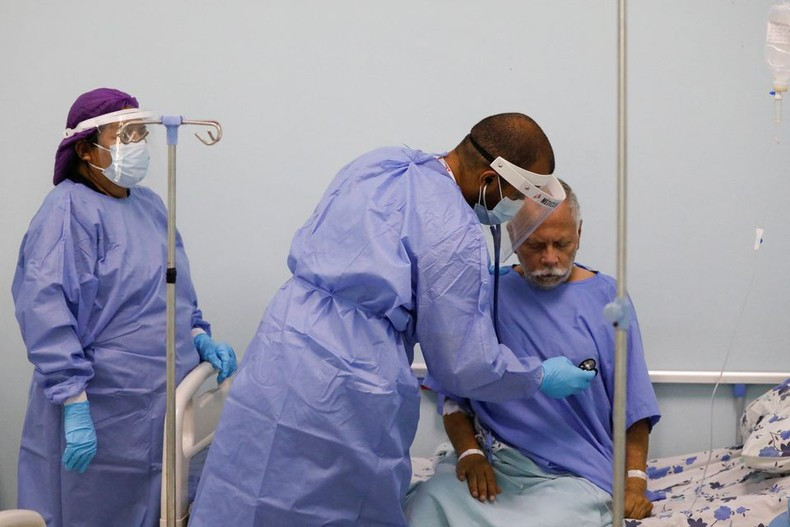2022 has been a difficult year for the global health system amid many diseases at the same time. The world has experienced the third year of the COVID-19 pandemic, while outbreaks of monkeypox (mpox), cholera, ebola and respiratory diseases took place on every continent.
The prolonged COVID-19 syndrome has caused serious deterioration in people’s physical and mental health. The healthcare systems of many countries were often overloaded due to an increase in the number of patients and a serious shortage of human resources.
Overcoming the challenge of overlapping epidemics
However, experiencing a series of challenges, WHO Director-General Tedros Adhanom Ghebreyesus expected that 2023 there are emerging hopes for global health in 2023 as COVID-19 pandemic and mpox outbreaks are waning and there have been no new cases of Ebola in Uganda for more than three weeks.
2022 was once considered the year of the "tsunami" of Omicron and its sub-variants. According to WHO, there are currently more than 500 sublines of the Omicron variant, which is highly transmissible. The number of new COVID-19 cases had increased sharply in France, Germany, Italy, the Republic of Korea, Singapore, Australia, etc. However, the achievements in research and coverage of vaccines have brought a step forward in the fight against the pandemic.
At a recent press conference, Ghebreyesus said that the number of weekly deaths due to COVID-19 is now only about a fifth of what it was a year ago. Maria Van Kerkhove, the technical lead for the COVID-19 response at the WHO, said that although there is still the possibility of outbreaks, the COVID-19 pandemic is “not what it was at the beginning” with less hospitalisations and deaths. According to her, the majority of deaths have occurred in people who were not vaccinated or fully vaccinated. To date, more than 6.6 million deaths from COVID-19 have been reported to WHO.
In 2022, the world also had to cope with a sudden outbreak of the mpox. In August, the administration of US President Joe Biden declared mpox a public health emergency, after the country recorded more than 6,000 cases. WHO data showed that more than 81,300 cases of the disease were recorded in more than 100 countries and territories since the epidemic’s outbreak in early 2022.
However, the implementation of vaccination as well as efforts to raise people's awareness of the disease’s risks have slowed the spread of the epidemic. The US Department of Health and Human Services expects that monkeypox will no longer be considered a public health emergency from February 1, 2023.
Other diseases such as seasonal flu, cholera, dengue fever, etc. have also been complicated. In Germany, the Robert Koch Institute (RKI) said that about 9.5 million Germans have recently taken sick leave, significantly higher than in the same period more than two years ago, when the COVID-19 epidemic broke out seriously. According to the European Centre for Disease Control and Prevention (ECDC), the simultaneous raging of respiratory syncytial virus (RSV), seasonal influenza virus and SARS-CoV-2 causing COVID-19 has created significant pressure on the health system.
The direct impact of climate change, along with unprecedented droughts, floods and cyclones in several countries, have created a favourable environment for the viruses to spread. However, the world is recording positive changes in both awareness and action related to climate change adaptation. The success of the 27th Conference of the Parties to the United Nations Framework Convention on Climate Change and the 15th Conference of the Parties to the United Nations Convention on Biological Diversity (COP15) reflected the determination to promote international cooperation in response to climate change, creation of a healthy living environment and human health protection.
 |
| Doctors are examine a COVID-19 patient. (Photo: Reuters) |
Key tasks
Although expecting a prosperous new year for global health, the WHO’s head also expressed caution as asking countries not to be subjective and to focus on five priority tasks. They are health promotion and disease prevention by transitioning from disease care to health care; the strengthening of universal health coverage, especially primary health care; the enhancement of preparedness and emergency response; the promotion of scientific and technological research; and continuing to reform WHO’s organisational structure. These tasks require the consensus among all countries to maintain the achievements made in the fight against the epidemic as well as create a stronger shield to deal with similar epidemics in the future.
Under the plan, discussions on a draft global agreement to better respond to future pandemics will start in February 2023. a member of the WHO's Intergovernmental Negotiating Body, emphasised that people must never forget the impact of the pandemic on life, economy and society in general. After three years since the first outbreak of the COVID-19 pandemic, the world seems to be very aware of the importance of preparedness for the response to the pandemic as well as avoiding the repeat of the mistakes as before.
The lessons of solidarity, sharing of vaccines and promotion of a mechanism of fair distribution instead of racing to hoard vaccines are still valid. Some argued that any pandemic treaty should commit to an automatic waiver of intellectual property rules for necessary products necessary for health protection. Besides, the elimination of stigma, discrimination and acts of spreading false information on media platforms is also a lesson.
The return of many diseases in 2022 is a reminder to the world about the complicated and unpredictable nature of the epidemic. Raising vigilance and coordinating to build effective global systems to promptly detect, prevent and respond to pandemics are the common responsibility of all countries for people’s health.
















